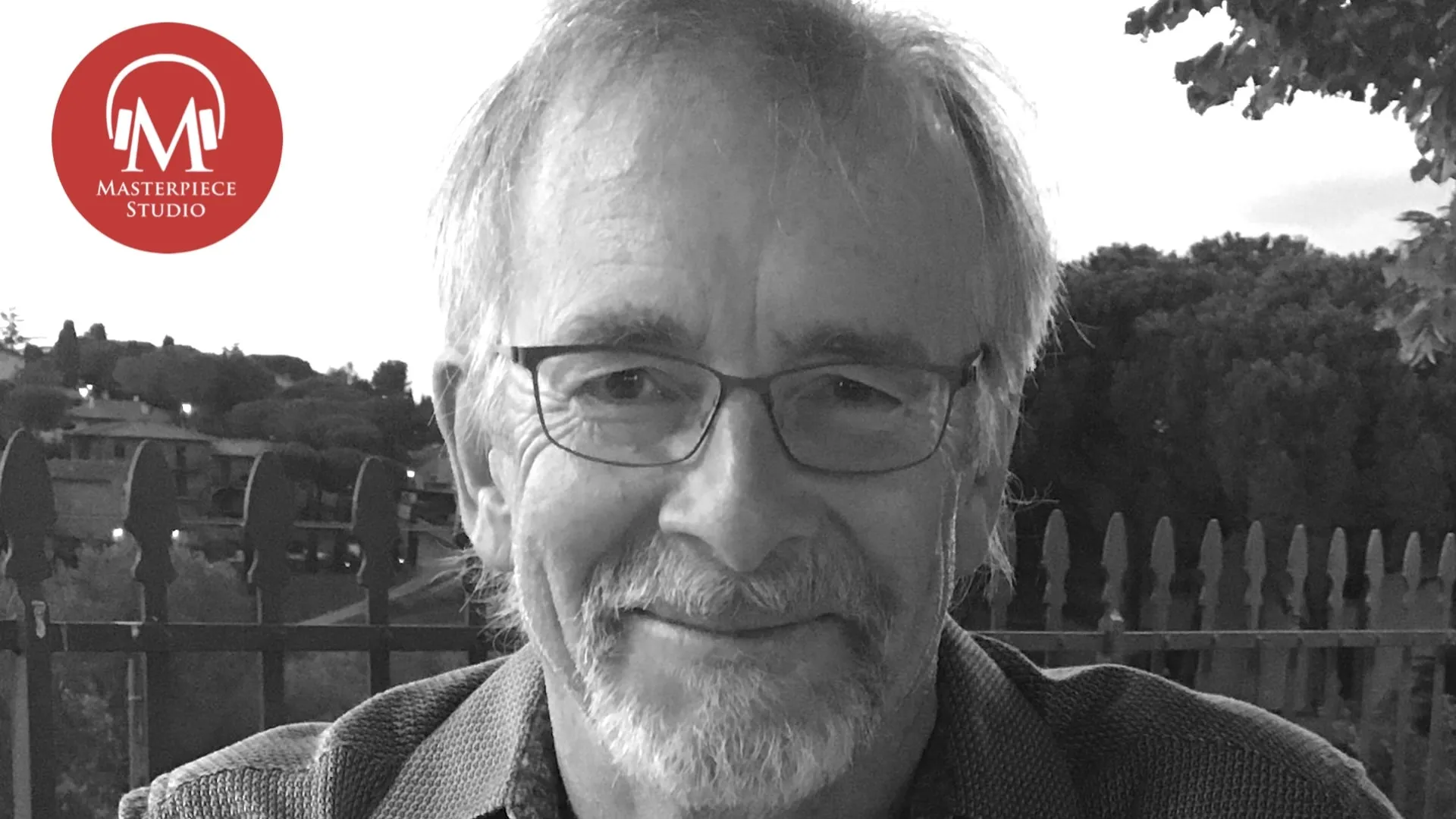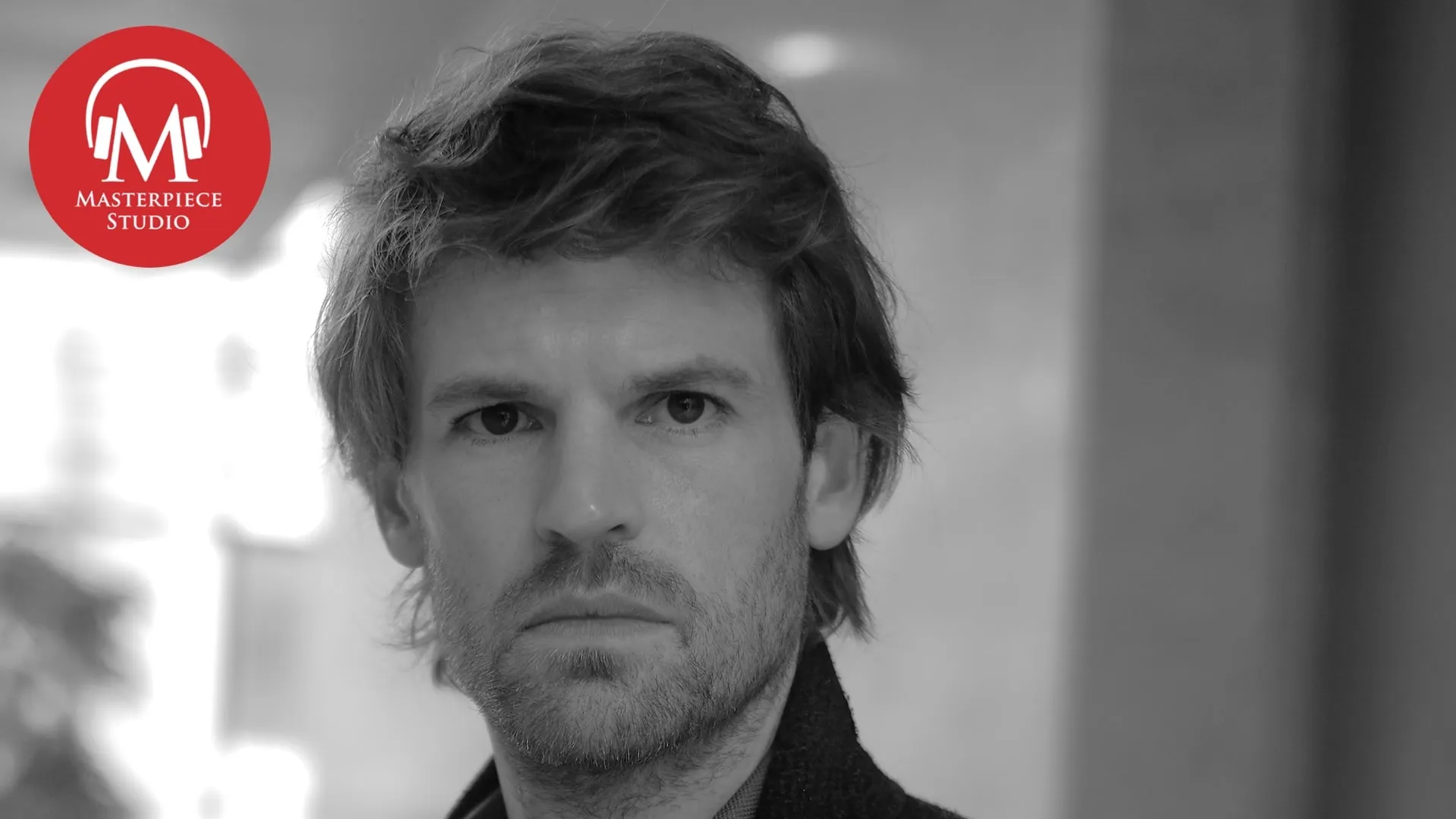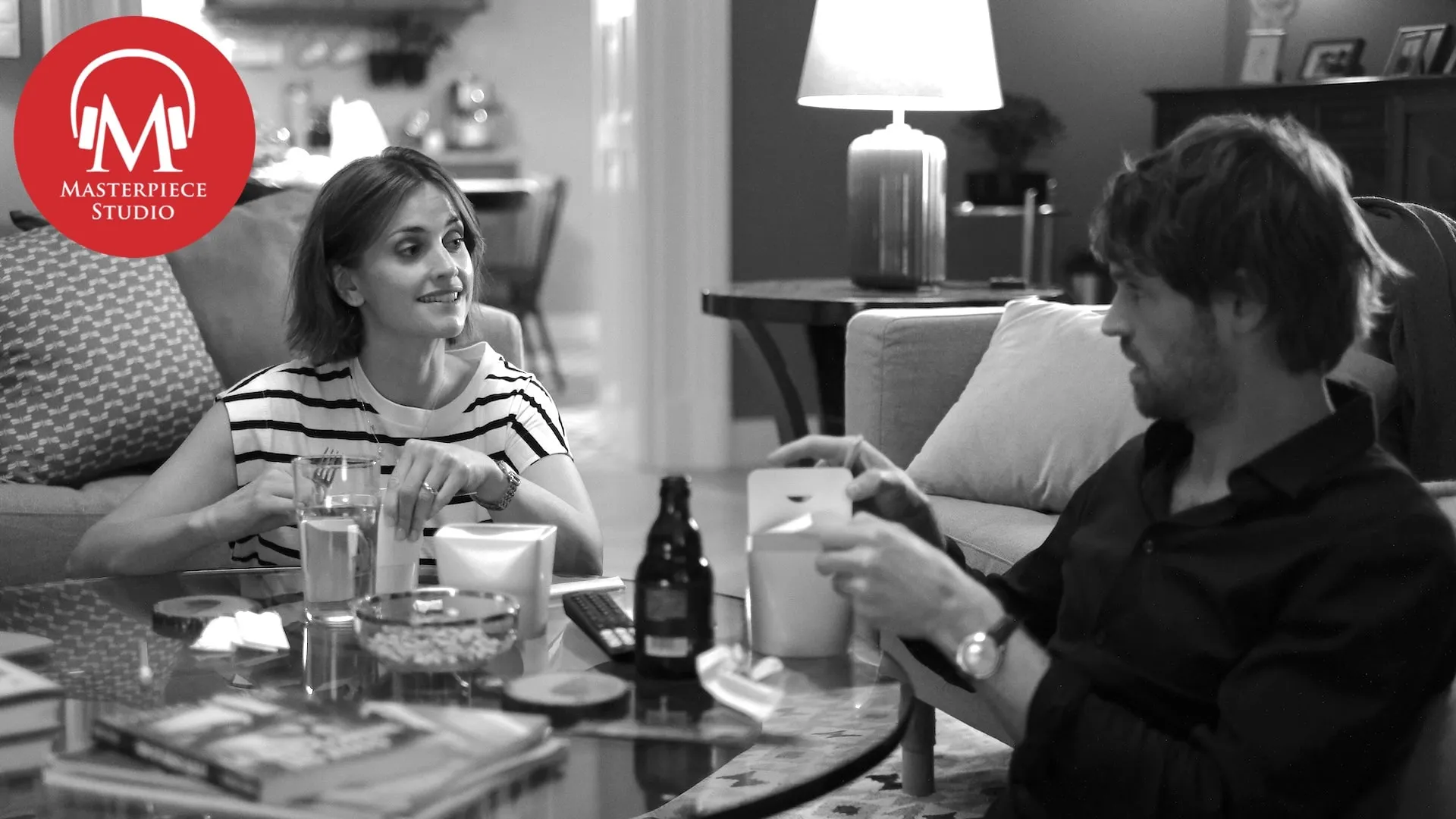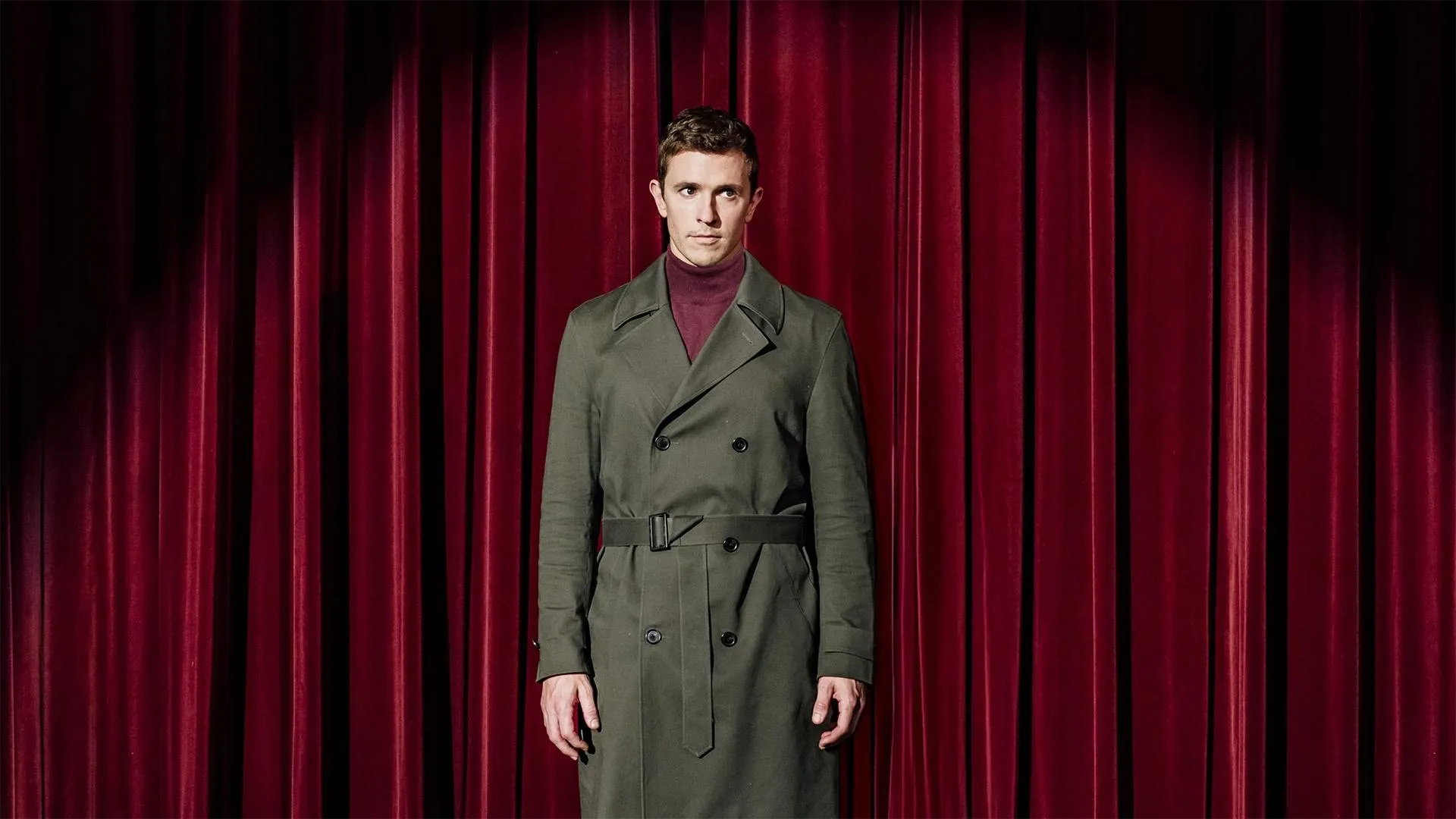
Patrick Harbinson, Maigret | MASTERPIECE Studio
Released October 13, 2025 30:28
WARNING: This episode contains spoilers for Episode 2 of Maigret. When adapting Georges Simenon’s Maigret for the screen, lead writer, director, and executive producer Patrick Harbinson wanted to bring the classic character into the modern day. In this conversation, Patrick talks about the decisions he made to showcase Maigret as a younger detective with something to prove, and what we can expect from the rest of the season.
This script has been lightly edited for clarity.
Jace Lacob: I’m Jace Lacob and you’re listening to MASTERPIECE Studio.
For our mystery buffs out there, Inspector Maigret is likely a character you’ve encountered before. Perhaps you’ve seen him on screen in one form or another, played by one of over 30 actors including Michael Gambon and Rowan Atkinson. Or maybe you’ve come across him in one of Georges Simenon’s 75 novels featuring the talented French detective.
But unlike these Maigrets of the past, our new Maigret has ditched his iconic pipe and bowler hat in exchange for a mobile phone. However, despite these surface-level changes, his moral code remains strong. Not all crimes are weighed equally in Maigret's eyes. Murder, for example, will always trump money.
CLIP
Kernavel: You should concentrate on more urgent cases, which right now are these bank robberies. Any leads yet?
Maigret: Not yet. They’re clever.
Kernavel: Three robberies and no leads. It’s not exactly impressive, is it?
Maigret: They won’t always be clever. Besides it’s just money, no one’s died.
Kernavel: Not yet.
Often called “The Sherlock Holmes of France,” Maigret has a knack for solving mysteries. But his true interest is in solving people.
CLIP
Maigret: That’s an unusual tattoo. Have you ever seen a seahorse?
Cuendet: Only this one. In Marseilles.
Maigret: In the sea?
Cuendet: In a woman’s room.
Maigret: Was she your girlfriend?
Cuendet: Is that any of your business?
Maigret: Not really. I’m just curious.
Cuendet: A curious policeman.
Maigret: That’s right.
But it’s not all investigations and interrogations. This series also shows a more tender side to the determined detective, who is — as in Simenon’s novels — buoyed by his better half. Maigret and his wife Louise have been trying to conceive, and by the end of Episode Two, she calls him with an update.
CLIP
Maigret: Darling, I’m sorry, I just -
Louise: I think I’m going to start moving the stuff out of the spare room.
Maigret: You’ve done the test.
Louise: I’ve done the test.
Maigret: I’ll be home as soon as I can.
Today, we talk with Maigret lead writer, director, and executive producer Patrick Harbinson about the decisions he made bringing this classic character to the contemporary screen, and what we can expect from the rest of the season.
Jace Lacob: And this week we are joined by Maigret lead writer, director and executive producer Patrick Harbinson. Welcome.
Patrick Harbinson: Thank you. Good to be here.
Jace Lacob: In adapting Georges Simenon's Maigret, did you have an underlying emotional connection to the character or to the 75 novels and 28 short stories that Simenon wrote, featuring the bowler hat-wearing, pipe smoking French detective?
Patrick Harbinson: Not quite an emotional connection. I think I had more of a reaction to what had gone before me; the various adaptations in English of Simenon that I knew of, the one in the 60s’ the BBC did, then Michael Gambon in the 90s’, and then Rowan Atkinson in 2015, 2016. And my reaction, while admiring them, was that I thought those adaptations were completely faithful, George Simenon himself loved the BBC one, but I felt there is another side to Maigret, a wit, humor, a certain lightness in his dialogue and in his attitudes that I felt we hadn't seen. And when the decision was made by a combination of PBS and Playground and myself, young Maigret, that immediately brought all those things into focus.
Jace Lacob: As you say, this is the first time Maigret appears in a modern adaptation. And the bowler hat is gone, the overcoat, that grizzled detective, and in his place, as you say, is a younger Maigret, still happily married, but with something to prove. Which qualities of the character of Maigret did you consider non-negotiable to preserve even in a contemporary setting? Was there a sense, perhaps even, that the pipe might be jettisoned altogether?
Patrick Harbinson: The pipe was so nearly jettisoned a dozen times. But in the end, as I was walking once down the King's Road when I was just about to fly to Budapest to start production, I saw a guy in his early 30s smoking a pipe. And I thought, people are still smoking pipes? Tony Blair's inner circle apparently, his young guys are all smoking pipes. So I thought, let's keep the pipe, but have it be a pipe that is frowned upon by everyone. So there are pipe signs with lines through them everywhere. “No pipe smoking here”. We don't see him smoke the pipe at all in Series One. So, I felt that was a kind of non-negotiable. I thought of vaping and chewing gum and all that nonsense. But no, pipe is kind of a non-negotiable. But it becomes, as anyone who watches this will see, his kind of worry bead. It's what he turns to when he's thinking hard.
So that was one non-negotiable. The other was Simenon's attitude, which becomes Maigret’s attitude towards the criminal. That fascinating sympathy, which is almost empathy, was key even to young Maigret. He feels he feels closer sometimes to the criminal than the victim, which I think is just a fascinating psychological aspect to any detective.
Jace Lacob: Ben Wainwright's Maigret feels different to the character previously played by a host of others, including Gambon and Rowan Atkinson. He's at a different point in his life. He has a different perspective as a result. How did you look to ensure that this Maigret feels authentic to long time fans, but speaks to a new audience in 2025?
Patrick Harbinson: That was the question I asked myself most often writing, prepping, directing, post-production. Because basically a young, you know what Ben looks like, he's a tall, good looking young man, late 30s. So how do you imbue this young man with the necessary life experience so that he can… every street he goes down you have a sense he knows what's going on there. He knows the criminals. He knows the politicians. He knows the other policemen. He's at home in this city. How can I give a young man, basically almost a callow young man, that life experience?
And I was lucky in Ben in that he has a certain stillness to him, even when he's moving quickly. There was a quality to him that we all loved in casting and why he got the role. He was a young man who has seen and lived many things, not always to his credit. And so that was the key. Because my personal feeling is that people who loved Gambon and Atkinson in Maigret will be a little bit shocked by this, this young man and his beautiful young wife and think, is this Maigret? He will grow on them as they realise yes, he has all the characteristics of Maigret; the silence, the profound ability to observe without judging. All those qualities, I believe, will bring the old Maigret fans in to love this version of Maigret. And I think those who don't know Maigret at all will see a sort of a complex and charismatic young man caring deeply about the crimes he's investigating.
Jace Lacob: Let's talk about that care. So the character has been called the “Sherlock Holmes of France.” But what really separates Maigret in the pantheon of crime solving detectives is that as Scott Bradfield wrote in a 2015 New York Times piece, “Maigret rarely solves crimes. Instead, he solves people.” Is there a bigger statement to be made then within Maigret about embodying that sense of empathy, of striving to understand and leading with curiosity rather than criticism in an era where that notion might seem further away than ever?
Patrick Harbinson: Yeah, I think so. You've stated it perfectly. That is what this Maigret does. Maigret is quite hard nosed as well. But he is very curious about where people come from and why they do what they do. And this was also important to Simenon, who grew up as a young man in occupied Belgium and saw how people were treated after the war, who collaborated. But he knew everyone had collaborated. So he has a very sort of jaundiced view of those who take moral, judgemental positions and Maigret does too. Maigret can solve crimes because he understands the need that drove the criminal to commit the crime, even if that need is a reprehensible one. He understands greed, fear, lust, etc. He doesn't judge them, he just knows that's what has made this particular individual tick. And I think that speaks to today, what is the need that drives people to crime?
Jace Lacob: Maigret often seems like he has the weight of the world on his shoulders. He's solving some of Paris's worst crimes, but he's both lifted up and grounded by his dynamic with his wife, Louise. Here, Madame Maigret is a psychiatric nurse, one who, like her husband, sees a different side to humanity. How did you look to update Louise?
Patrick Harbinson: Again, this was a big discussion, both for me internally and with David Stern, Playground, what would we do? I at first wanted to make her a doctor, actually professionalize her even more so she was his equal professionally. Not to say a psychiatric nurse isn't his equal, but it's to basically give her a similar social status. There was some pushback from the estate on that one. And I, in the end, listened to them. And I'm glad I did, actually, because it's given me room to move with her.
And so I wanted her to have a job because anyone who reads any Maigret novel, there is bound to be at least two scenes where Maigret comes home for the beautifully prepared dinner or lunch, whatever it is. And so, anyone who watches the first film will see that the first meal they have together is a Vietnamese takeout that Maigret has bought on his way home after a harrowing day.
They do love their food. She does cook for him, he will cook for her. And the kitchen table, if you like, is the heart of their home and almost of their relationship. So that doesn't change. I'm true to that, but I'm just saying that the point of the psychiatric nurse job is that it is, as we see almost the very first time we see her, it's not Maigret who's coming home in the middle of the night, it's Louise. She's had a double shift in her hospital, and it's she who comes home and hands him his ringing phone. That very simply is being true to the Madame Maigret of the novels and setting her in 2025, 2026.
Jace Lacob: Maigret is known for his close relationship with his direct report detectives, Les Maigrets, Lucas, Janvier, Lapointe and Torrence, known as the “faithful four”. Given how closely Les Maigrets worked together, how important was it that this fivesome’s chemistry radiate on screen? How did you look to create that level of closeness and support?
Patrick Harbinson: I think I had a much easier job than the writers who came before me, the Gambon writers and the Atkinson writers because by contemporizing it, I was factually bound to make this foursome more diverse than they've ever been. I mean, they’re usually, naturally, four white middle aged men. And so the fact that it's in Paris in 2025 meant that it would be weird not to have a senior woman on the team. It would be weird not to have a North African. So it was like suddenly I was able to have a whole range of relationships, from the one with Lucas, who is kind of the key character, almost the number two in so many of the books, and the fact that she's a highly competent sergeant in her mid-late thirties who has a sort of tiny crush on him, which she would never admit to, but everyone knows about.
That was just such easy, I wouldn't say easy chemistry, but such natural chemistry to play. And I wrote almost nothing for it. But Kerrie, who plays Lucas, just delivered it so effortlessly. So there was that chemistry. And then young Shaniqua Okwok who's playing Janvier, who's also one of the key detectives there, the fact that she's a Caribbean black woman, or her family was and she's now there. And she's just this reckless, and fearless, young policewoman was, again, just fun. I was able to play with all the tones and colors that that gave me. And so there's one white, middle aged detective, brilliantly played by Blake Harrison who is Torrence. And he's, if you like, the archetype of the Maigret supporting detective and I think a brilliant one.
So it was fun. And that was one of the, I would say, easy. It just felt once I'd made those decisions, they felt right. And they wrote themselves with relative smoothness throughout all six episodes and beyond. So that was nice.
Jace Lacob: The first two episodes of Maigret, written and directed by you as you said, are based on Simenon's 1961 novel The Lazy Burglar. And Maigret has to grapple with these two cases, a string of high profile bank robberies and the murder of a thief, Honoré Cuendet. In this particular case, Maigret's intuition is matched by his empathy, fueled by his respect for Honoré. And his sense of humanity permeates his actions. He's told to stop investigating Honoré's murder to focus on the robberies, and he tells Lucas,
CLIP
Maigret: Are you coming to protect me?
Lucas: Yes, from temptation. Level with me boss. Why are you risking a bust-up with Kernavel over a burglar?
Maigret: Honoré Cuendet never hurt a soul. He was brutally murdered. If we can’t investigate that, then what are we even doing here?
Jace Lacob: How does that sum up Maigret's mission statement?
Patrick Harbinson: When one is starting a detective series, without being too self-conscious about it, you're kind of looking for the moments where you say, well, what is he about? And how can he say it without it being self-conscious? And there was that moment. Lucas, who is protective of Maigret and realizes he is treading on thin ice, asks the question and he gives her the angrily, I mean, because this is one of the, again to sort of turn sideways a little for a moment, this is one of the advantages of having a young Maigret which will surprise old Maigret aficionados, when I say old I mean previous, he answers angrily. He turns on her and says “if can't investigate that, what are we doing here?” And I loved having a younger detective so that I could have anger, mistakes, blah, blah, blah.
So, in terms of mission statement, I think it captures it perfectly. He is not excusing Honoré. He knows he's a thief. He's tried to arrest him before. But he's almost admiring of the fact that he's never been able to catch this man. He knows his methods. He knows what he does, and he has outwitted Maigret for five to ten years. There's a kind of rueful admiration there, which is part of the empathy. And then the fact that the manner of his death is unnecessary, as James Northcote who plays Moers, says, “They killed him, then they went on killing him.” It's that line, and I think we feel anger here, which is fed all the time, unwittingly by Kernavel played by Nathalie Armin, who says, which is this line is a direct quote from the novel, when she sees the dead burglar beside the Seine, she says, “It's a tragedy, but there are so many. Go and investigate the bank robberies.” So that just struck me. Again, it's why I chose the book. It caught to me perfectly the particular verity of Maigret as a detective.
MIDROLL
Jace Lacob: And we’re back with Maigret writer, director, and executive producer Patrick Harbinson. Small details pepper the interview scenes like the seahorse, which Honoré says he saw once in a woman's room. The pacing of the interrogations feels deliberately unhurried, a contrast to rapid fire police interviews. What effect were you aiming for compared to the more frantic beats of many modern crime dramas?
Patrick Harbinson: It's partly the way the research informed me. The French police see the investigation of a crime which is very different from the Anglo-Saxon i.e the American British way of investigating a crime. They feel that the psychology of the criminal and his or her background, familial antecedents etc., is just as important. They want a full picture of who this person is and where they came from.
And so what I had there in that little interview, it's about a dozen lines with Maigret and Cuendet, was an opportunity just to show a French policeman, a French detective, asking very personal questions, which almost have nothing to do with the crime. The seahorse tattoo. Where did you get it? Was she your girlfriend? And eventually the interrogatee shuts him down, “Is that any of your business?” “No. It's not.” And then he turns on to more prosaic things about robberies and so on. So it was an opportunity in a relaxed way to A) what I want to do is establish a sort of fondness almost between these two, they're playing a game. But also that particular French interest in psychology.
Jace Lacob: The flashback leads Maigret to the home of Justine, Honoré's mother, and he has to tell her that her son is dead.
CLIP
Maigret: He’s still collecting his magazines?
Justine: Why shouldn’t he? What have you arrested him for this time?
Maigret: I haven’t.
Justine: So why are you looking for him?
Maigret: I’m sorry, Justine. Honoré is dead. I’m sorry.
Justine: Did you lot kill him?
Maigret: No. He was found this morning beside the Seine.
Jace Lacob: And we feel he's entirely truthful here. He treats Honoré Cuendet's memory with a certain respect while probing for leads. As both writer and director here, how do you balance showing Maigret’s compassion with his need to extract the truth?
Patrick Harbinson: I was helped by the novel first of all, because the scene with Justine is quite clear there. And though I changed a lot of details and added a lot more I had that normal police entry, a detective's entry into a scene where you're not telling the relative everything you should in order to see if you are going to get any information from her. And he does. So Maigret goes in asking questions as if Honoré were still alive. So he is concealing information. So that part of him is, if you like, being the tough policeman, detective, not telling the woman whom he knows is going to be absolutely devastated by this information that he will eventually give her.
So that was the dynamic. And she senses, because she knows him well, that he's holding something back. And eventually asks the question and he can no longer conceal the truth. In terms of writing and then directing, that was a fairly simple dynamic. And interesting, that was the first scene we did and the first full scene I've ever directed. And Justine, who's played by Amira Ghazalla, she was fantastic. And so I just thought the scene had so much in it. And the two of them, especially Justine, managed to bring so much exquisite, restrained emotion to it that I knew by the end of the day, I thought, this will work. This will work, this detective will work, and this story will work because it's emotional.
Jace Lacob: I want to dive into that a little more. Cuendet isn't a saint. He's a known burglar. Maigret fights for him because that's his mission. Justine kisses Maigret's forehead and says, “My home is your home.” For a man in exile from his own home, what's embedded within this message from Justine? How does Maigret read her forgiveness of him and her gratitude?
Patrick Harbinson: Doesn't she deliver that line well? She's amazing, Amira. We've seen him go into her home as an invader, a home that he's been into many times, so often that he knows that the cat hates him. And it was to say she has let him into her heart was the point of that. And he accepts that. It's like this is not a friendship at all, but it's like it's an acknowledgment that she is saying thank you in the best way she can, which is, my heart, my home are yours.
And for a man who, as you say, has this sort of hole in his heart where his home is concerned, which we will fill throughout the course of this first season, you can see how moved he is by it. It came to me late in writing. It was like, I need to resolve these two characters because they are in fact, they're the emotional through line of the whole story. And I think it worked beautifully because of, frankly, because of some beautiful acting.
Jace Lacob: And beautiful writing, I'll say. At the end of Episode Two, Rafik and Buondonno escape any culpability for Honoré's murder heading for freedom in Syria.
CLIP
Maigret: Where are Rafik and Buondonno?
Danet: Probably half-way to Damascus.
Maigret: Was it you?
Danet: No. More likely a balls-up at your end, or the Syrians sneaked him out. Rafik was of value to them too. I told you to leave it alone, Maigret. Now you’ve lost your case and I’ve lost my source. Nobody wins.
Maigret: Especially not Justine Cuendet.
Danet: Maybe she should have brought up her son to be a better citizen. I bet this’ll ease her pain. She’s the mother of a thief after all. She can share it with that pretty little hat maker.
Maigret: Do you know what they’ll want to do with this?
Danet: Yes, cash it in and live it large for the rest of their lives. Everyone’s a saint till they get the smell of money.
Maigret: I should make you swallow this.
Danet: No, please!
Maigret: They already said: they don’t want it, or your dirty money.
Jace Lacob: How much does the inequity of the justice system, Honoré dead and his killers free rankle Maigret?
Patrick Harbinson: Well, first of all, I agree with Danet. This is where the writer has to occupy both camps if he's or she's being honest. Danet’s right. Cudendet was a thief basically from the age of 18 and he loved being a thief. He was just a particular kind of thief. Not a breaker and entry. He just loved things. And even his mother in an earlier scene says it was in his nature. She is wise to his failings as much as she loves him. So I didn't want to be sentimental about this. It's not a Robin Hood story.
So I was glad to be able to say Danet’s line. And I think Danet is the right person to say it. On the other hand, Danet is profoundly cynical, as you know, and in this scene, he will try and sort of buy off Maigret, basically, and Justine, because he knows basically two murderers got away with it. Danet's not an idiot. And so he makes Maigret an offer, which funnily enough in writing the first film, it was the moment of anger that we see in Maigret, fury, was where I thought, I've got him. I've caught young Maigret. This is it. Old Maigret, Maigret that we've seen before for the last, ever since 1932, I think. Renoir does the first Maigret film. We've never seen this level of fury before, and I thought this is how a young man would react who is enraged by the cynicism of the gesture that Danet makes.
And that I thought, I've caught the actor here. This is the key. This Maigret is capable of those things because he has not grown into himself yet. He cannot control his emotions as well as he will be able to in five or ten years.
Jace Lacob: At the end of Episode Two, Maigret returns home to finish his celebratory champagne toast with Louise. “To us, Maigret.” Louise says, clinking their glasses. And this is gorgeously framed by the doorway to their kitchen, the heart of their home. How does this final image, true riches, contrast against the scattered diamonds in the street of the previous scene?
Patrick Harbinson: That's just luck of the story, isn't it? When I knew there was a necklace and I knew that Danet was going to offer it, I knew it was going to end up broken on the street with Danet, with brilliant actor Sam Troughton crawling around picking up diamonds, while Maigret strides off, slowly shedding his fury, and into the calm of his home, where he’s still coming down from this anger.
And then in order to get, this is where these two actors, wonderful, to get the deceleration from a moment of extreme emotional stress into a scene where they're celebrating the good news, they've had the news that Madame Louise Maigret is finally pregnant after so many years of trying. That that framing, I kind of knew, once I knew I was directing this and knew the set, I knew that we needed to be able to keep them still, happy in each other, sort of just looking at each other, happy in each other's company and just let the camera come back and we just see them there and know that this couple doesn't need us, doesn't need anyone. They are complete of themselves.
Jace Lacob: Given what Maigret and Louise know about human nature from their work, is their effort to have a child a glimmer of optimism and hope where one might expect ennui or cynicism?
Patrick Harbinson: Definitely. To me, definitely. It's funny, I'd read almost 30, I haven't read all the books, but I read maybe 40 now, and it was only in one of them, I can't remember which one I should have written it down where I suddenly saw a line about the heartbreak that was Louise's, Madame Maigret’s life, that she'd never had a child. And I thought, oh, gosh yes, why didn't they? So it had been something they had both wanted. And it was just, again, the beauty of having a younger Maigret I was able to pretty effortlessly honestly, dramatize the story of any couple trying to conceive.
Anyway, I kind of felt that it was especially in terms of the first story, the idea that something they had been long trying suddenly had worked, and that we could see the two of them almost glowing with happiness at what they had managed to get. Yes, and again, this was really important for me for the whole series that this Maigret, its tone should be warm. Its design colors, the palette that our brilliant designer and cinematographers gave us is actually warm. There's very little cold blue in it or gray or the noiry-feel is not there. And I wanted the stories to have this bath of warmth to them, too. And this is the warmest moment frankly, in the six hours. Many sad things happen, but I did want this to be like a beacon of hope.
Jace Lacob: You came to a career in screenwriting after a stint as a soldier in the British Army. How did that inform your writing or your process?
Patrick Harbinson: It was my minor version of being Simenon. It was a brief and intensely enjoyable, but somewhat occasionally terrifying, not because of action or anything just because of my incompetence, introduction to real life at the age of 18. So at the age of 18, I'm sort of at the head of convoys of literally 100 armoured vehicles driving through the suburbs of Dusseldorf at night because I've taken a wrong turn off an autobahn.
So it's those sort of experiences and then live fire exercises in Canada or in Germany. They make you grow up quickly and they introduce you to a wide range of character, personality, class, ugliness, beauty, everything else. I really think it kind of helped me grow up very quickly. And then, of course, I went to university and forgot all about it for four years because I was just having fun and directing plays. But I realized when I started writing seriously that a lot of the stories I wanted to tell were coming out, not so much out of things that had happened, but out of people I'd met, voices I'd heard that were still really clear in my head.
Jace Lacob: Patrick Harbinson, thank you so very much.
Patrick Harbinson: Thank you, Jace. It was a great pleasure.
Next time in 1980s Bristol, the gold chain begins to unravel as smelting three tons of stolen gold bullion begins to take its toll on everyone involved.
CLIP
John: What’s this, then?
Marnie: Tenerife. We leave on Friday. Two weeks.
John: I can’t.
Marnie: You can.
John: I’m not finished.
Marnie: You can’t live like this John.
Tune in next week to hear from The Gold star Stefanie Martini as she shares what it was like to put on that big ‘80s wig and embody the real-life Marnie Palmer.
Maigret Podcasts
2 More Podcasts
MASTERPIECE Newsletter
Sign up to get the latest news on your favorite dramas and mysteries, as well as exclusive content, video, sweepstakes and more.





